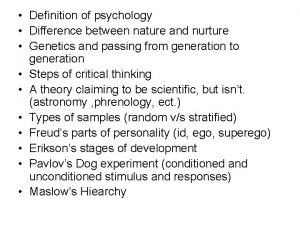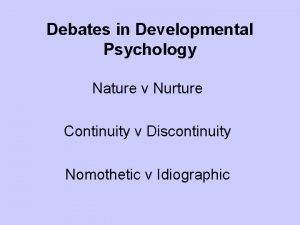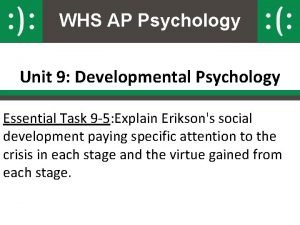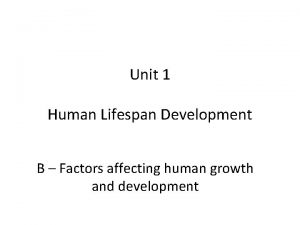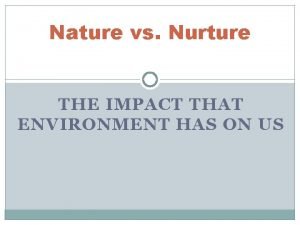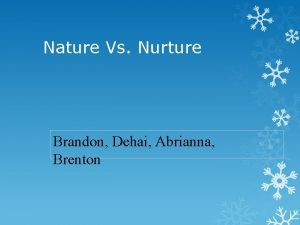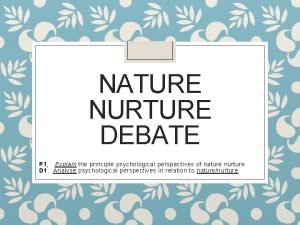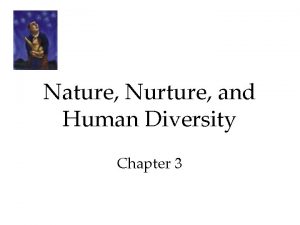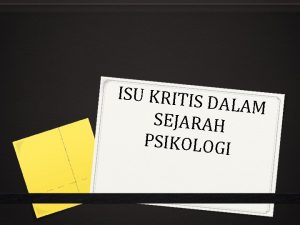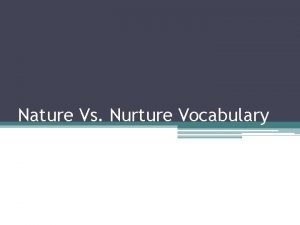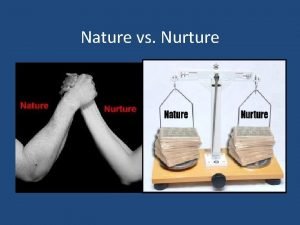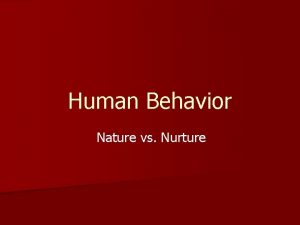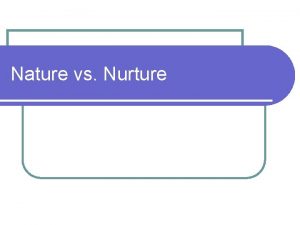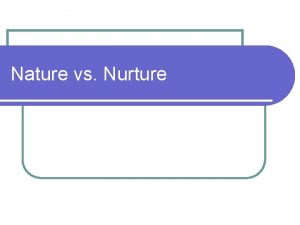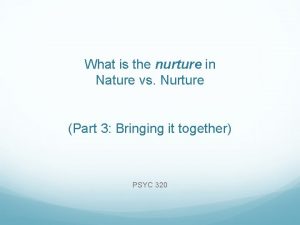Unit 3 Developmental Psychology Nature v Nurture Is
















- Slides: 16

Unit 3: Developmental Psychology Nature v. Nurture Is our behavior instinctual or learned? Ch. 3: Infancy Ch. 4: Adolescence Ch. 5: Adulthood & Aging

Ch. 3: Infancy Physical Development Social Development Cognitive Development

Physical Development Reflexes: sucking, grasping, startle, Babinski Motor Dev -gross (full body) -fine (fingers/toes) Perceptual Dev (through senses) -hearing before vision -sweet before sour -smell

Language Dev -1 st year = babble that imitates sound, as learn it people react & then learn more -telegraphic speech = message clear, verb tense wrong

Social / Emotional Dev. 1. Attachment -emotional ties between people -secure or insecure -secure shown through stranger & separation anxieties -caused by contact comfort, imprinting

2. Socialization -learning acceptable & unacceptable behavior -bullying 3. Self-esteem

4. Parenting -authoritariam -authoritative -responsive, establishment of limits, assume responsibility, identify with parents -permissive Assignment: Read & Discuss Spanking Article

5. Daycare -advantages? -disadvantages? 6. Child Neglect -failure to give adequate food, shelter, clothing, schooling, emotional support Assignment: Timeline

Timeline Show the following items on your memory timeline to demonstrate knowledge of psychological development as it was occurring in your own life. Timeline = 38 points Memories (20) Fine Motor (2) – varying ages Gross Motor (2) – varying ages Attachment (2) – friends, family Childcare (2) – preschool, daycare Parenting Style (2) – childhood, later Self-Esteem (2) Nature/Nurture (2) Piaget’s Levels (4)

Theories of Social/Emotional Development Biological -nature Sociocultural -nurture Psychoanalytic -subconscious (p. 84) -Freud & Erikson

Cognitive Development: Jean Piaget 4 stages of brain development 1. Sensorimotor (0 -2) -coordinate senses with motor skills -3 -4 mos. : hands/legs -5 -6 mos: cause/effect -8 mos: object permanence (trust v. mistrust) -ends with language dev

2. Preoperational (2 -5) -pre-math words egocentrism – self-centered animistic – nature is alive 3. Concrete Operational (6 -13) less egocentric math, logic beginning to “figure things out”

4. Formal Operational (13 -adult) puberty critical thinking, opinion, morality (see Kohlberg p. 84 -85) Assignment: Piaget & Erikson Compare Erikson’s stages to Piaget. In your notes, write Erikson’s stage that corresponds to Piaget’s stages. Assignment: Child Dev Project

Child Development Project & Checklist Create a project that is either about or for children. Research should demonstrate knowledge of child psychology. Projects may consist of any type of media as long as the following criteria are met: 1. Content shows knowledge of child psychology 2. Media chosen conveys topic 3. Presentation’s message is clear 4. Illustration, text, and other design elements work well together 5. Project shows effort Grading Rubric

Child Development Grading Rubric Content Media Message Appear- Effort ance A Excellent; no glaring problems B Some issues C Average; could do better; basic D Below expectations

Assignments • Spanking Article • Comparison of Piaget & Erikson • Timeline • Project
 Nature v nurture psychology definition
Nature v nurture psychology definition Nature and nurture
Nature and nurture Continuity and stages psychology
Continuity and stages psychology Unit 9 developmental psychology
Unit 9 developmental psychology Unit 3 developmental psychology
Unit 3 developmental psychology Gesell theory
Gesell theory Nature vs nurture activities
Nature vs nurture activities Twins nature vs nurture
Twins nature vs nurture Dani lierow
Dani lierow Nature vs nurture examples
Nature vs nurture examples Examples of nature and nurture
Examples of nature and nurture Principles of nature and nurture
Principles of nature and nurture Nature of nurture chapter 3
Nature of nurture chapter 3 Nature of nurture chapter 3
Nature of nurture chapter 3 Alir locke
Alir locke Nature vs nurture dalam psikologi
Nature vs nurture dalam psikologi Chomsky nature vs nurture
Chomsky nature vs nurture
